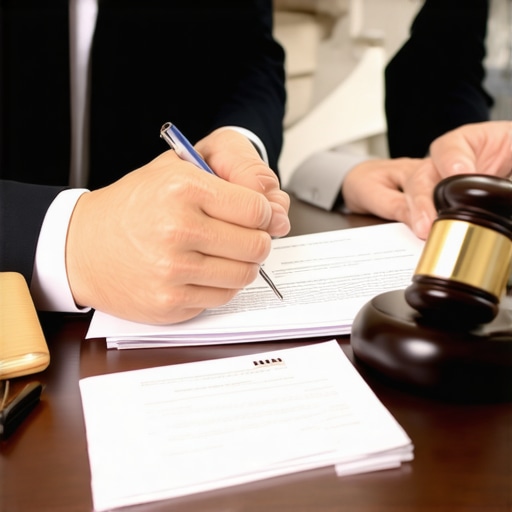
My Personal Encounter with Expert Legal Services: A Journey of Trust and Clarity
It all started when I faced a complex family matter that required more than just common advice. I remember feeling overwhelmed, unsure of where to turn or whom to trust. That’s when I discovered the importance of expert legal services for family, immigration, and litigation support—an experience that profoundly changed my perspective on legal help.
Why I Chose Specialized Legal Guidance Over DIY Solutions
In the age of information, it’s tempting to think we can handle legal issues ourselves. But I quickly learned that family law, immigration procedures, and litigation cases demand a deep understanding of the law. The difference between a generic lawyer and an expert legal team is the nuanced approach—something I experienced firsthand. They brought clarity to my situation and helped me navigate complex legal frameworks with confidence.
The Power of Personal Experience in Legal Matters
When I first consulted with a legal expert, I was struck by how personalized their advice was. They didn’t just give me generic information; they listened, understood my unique circumstances, and tailored their strategies accordingly. This level of personalized service built trust, which is essential when dealing with sensitive family or immigration issues.
What Makes a Family, Immigration & Litigation Support Service Truly Expert?
From my perspective, an expert legal service combines experience, specialization, and a genuine commitment to client welfare. For example, I found that firms with a dedicated focus on family and immigration law, like the ones detailed on Expert Law, offer invaluable insights and up-to-date legal knowledge that can make all the difference.
How Can I Tell If a Legal Service Is Truly Expert and Reliable?
This question often crossed my mind during my journey. I learned to look for credentials, client testimonials, and clear communication. An authoritative source like the American Bar Association emphasizes the importance of specialization and continuous education in law. Trustworthy legal services are transparent about their expertise and have a proven track record.
If you’re considering expert legal support for family, immigration, or litigation issues, I encourage you to explore options carefully. Sharing your experience or asking questions in the comments can also help others navigate their legal journeys with confidence.
Unveiling the Hallmarks of Truly Expert Legal Support in Family and Immigration Law
In my ongoing journey through the legal landscape, I’ve come to realize that not all legal services are created equal. The difference lies in the nuanced expertise, ongoing education, and genuine commitment to client success that distinguishes the best legal teams from the rest. But how can clients identify these qualities before making their choice?
What Are the Subtle Indicators of a High-Caliber Legal Practice?
Beyond credentials and testimonials, expert legal services often demonstrate a deep understanding of recent legal developments and a proactive approach to client communication. For instance, a law firm that regularly updates its knowledge base and shares insights through articles or seminars signals an ongoing commitment to excellence. Additionally, transparency about case strategies and clear, jargon-free explanations foster trust and showcase professionalism.
Consider the importance of specialization. A firm dedicated solely to family and immigration law, like those highlighted on Expert Law, is more likely to have the refined skill set necessary for complex cases. Specialization guarantees that attorneys are not only familiar with standard procedures but also adept at handling unique, nuanced situations that often arise in these legal areas.
The Role of Continuous Education and Certification in Legal Authority
Expert legal practitioners understand that law is an ever-evolving field. They invest in ongoing education, certifications, and memberships in professional associations such as the American Bar Association. Such credentials are more than badges—they reflect a dedication to staying at the forefront of legal developments, which directly benefits clients facing complex family or immigration issues.
How Do Expert Legal Services Manage the Emotional and Cultural Dimensions?
Handling family and immigration cases isn’t solely about legal technicalities; it involves navigating emotional and cultural sensitivities. Expert attorneys demonstrate cultural competence, understanding the diverse backgrounds of their clients and tailoring their approach accordingly. Empathy combined with legal expertise creates a therapeutic partnership, easing the often-stressful process.
For example, an immigration lawyer experienced in working with diverse communities can anticipate potential hurdles and communicate effectively across language barriers, ensuring clients feel understood and supported throughout the legal process.
< >
>
Beyond the Surface: The Subtle Art of Recognizing True Expertise in Legal Support
Through my personal journey, I’ve come to realize that genuine expertise isn’t just about credentials or impressive client lists; it’s about the nuanced understanding of the human stories behind each case. In my experience, the most impactful legal support is characterized by a lawyer’s ability to read between the lines, anticipate challenges, and adapt strategies to the unique emotional and cultural contexts of their clients. This depth of perception often distinguishes the good from the truly exceptional.
How Do Continuous Learning and Cultural Competence Shape a Lawyer’s Effectiveness?
Law is a dynamic field, constantly evolving with new laws, policies, and societal shifts. I learned this firsthand when I engaged with a legal team that regularly attended seminars, published articles, and maintained active memberships in professional associations like the American Bar Association. Their commitment to ongoing education translated into more accurate advice and innovative solutions tailored to complex family or immigration issues. Moreover, cultural competence became a cornerstone of their approach—understanding diverse backgrounds, respecting different values, and communicating effectively across language barriers. This holistic approach fostered trust and comfort, essential ingredients in navigating sensitive legal terrains.
What Are the Hidden Indicators of a Truly Expert Legal Practice?
While credentials are important, I found that the best legal services also demonstrate proactive engagement, such as sharing recent case updates or legal insights through blogs or seminars. Transparency about case strategies and a willingness to answer difficult questions openly signal a firm’s confidence and integrity. These qualities reassured me that my legal team was not only knowledgeable but also genuinely invested in my well-being.
For instance, a family lawyer who stays abreast of immigration policy changes—like updates from the U.S. Citizenship and Immigration Services—can provide timely advice that could significantly impact outcomes. Such dedication to staying current often results in more favorable resolutions for clients, and I believe this is a hallmark of true expertise.
Handling the Emotional and Cultural Nuances: A Personal Reflection
Legal cases involving families or immigrants are rarely purely technical. They are intertwined with emotions, cultural identities, and personal histories. I witnessed how expert attorneys empathize deeply, creating a partnership rooted in trust and understanding. They can read subtle cues—whether a hesitation or a tone shift—that reveal underlying concerns or fears. Addressing these with sensitivity not only improves the case outcome but also alleviates some of the stress clients carry.
This approach reminds me of a quote from Lawyers.com: “Legal expertise combined with emotional intelligence creates a formidable force in advocacy.” It’s a lesson I hold close, emphasizing that law is as much about people as it is about statutes.
If you’ve navigated similar paths or have insights to share about working with expert legal teams, I invite you to comment below. Sharing our experiences helps build a community of informed, empowered individuals ready to face legal challenges with confidence.

Unlocking the Depths of Legal Expertise: Beyond the Basic Frameworks
My ongoing journey through the labyrinth of legal intricacies has profoundly reinforced my appreciation for the subtle art of nuanced legal strategies. While foundational knowledge provides a necessary baseline, it is the mastery of complex, layered approaches that truly distinguishes expert legal practitioners. I recall a particular case where a deep understanding of immigration nuances, combined with cultural sensitivities, led to a groundbreaking resolution—an experience that underscored the importance of continual learning and adaptive thinking in this field.
The Significance of Specialized Certification and Its Impact on Client Outcomes
One aspect that often remains underappreciated is the role of advanced certifications and specialized training in elevating legal practice. For instance, certifications such as the American Bar Association’s advanced family law accreditation signal a commitment to excellence that directly benefits clients facing complex legal challenges. These credentials embody a dedication to staying at the forefront of legal developments, ensuring that advice and strategies are both innovative and compliant with the latest statutes.
How Do Expert Legal Teams Navigate Multidimensional Emotional and Cultural Layers?
Legal cases involving families or immigrants are inherently intertwined with emotional and cultural dimensions that require more than technical legal acumen. From my observations, truly proficient attorneys develop an intuitive sensitivity to these layers, often anticipating cultural misunderstandings before they escalate. They employ a combination of linguistic skills, cultural competence, and empathetic listening—elements that foster trust and facilitate smoother resolution processes. For example, an immigration lawyer adept in cross-cultural communication can effectively bridge language gaps, creating a therapeutic partnership that accelerates case progress.
What Advanced Techniques Do Leading Legal Practitioners Use to Stay Ahead of Evolving Laws?
Keeping pace with the ever-changing legal landscape demands proactive engagement with ongoing education, policy analysis, and participation in industry forums. I’ve discovered that top-tier legal teams regularly attend seminars, contribute to scholarly articles, and participate in professional associations such as the American Bar Association. These activities cultivate a sophisticated understanding of emerging legal trends, allowing them to craft strategies that are both innovative and compliant. Moreover, leveraging technology—like legal research platforms and case management tools—further enhances their ability to deliver precise, timely advice.

The Subtle Indicators of True Legal Mastery in Family and Immigration Law
Beyond credentials and accolades, genuine expertise manifests in the lawyer’s ability to read between the lines—interpreting unspoken client concerns, cultural cues, and emotional undercurrents. I learned that seasoned attorneys proactively share recent case updates, publish insightful articles, and openly discuss strategic adjustments—all signs of a confident, transparent practice. These indicators reveal a commitment to continuous improvement and client-centered service, which are hallmarks of truly exceptional legal support.
Integrating Emotional Intelligence and Legal Precision: The Best of Both Worlds
In my experience, the most effective legal advocates are those who seamlessly blend technical mastery with emotional intelligence. They recognize that legal success often hinges on understanding unarticulated fears, hopes, and cultural identities. For example, a family lawyer who respects and incorporates a client’s cultural background into legal strategy not only enhances case outcomes but also fosters a profound sense of trust and reassurance. This holistic approach transforms legal proceedings from mere transactions into empowering journeys.
For those eager to deepen their understanding or share their experiences navigating complex legal terrains, I invite you to engage in the comments. Your insights can illuminate new pathways for others seeking to master the delicate balance of expertise and empathy in law.
Things I Wish I Knew Earlier (or You Might Find Surprising)
1. The Power of Specialization
Initially, I underestimated how crucial it was to find a lawyer who specialized in family or immigration law. I thought general lawyers could handle everything, but I quickly realized that expertise in a specific area makes a huge difference in case outcomes and personalized service.
2. Continuous Education Matters
Attorneys who stay updated through seminars and certifications, like those from the American Bar Association, are better equipped to handle evolving laws. I wish I had known to look for this proactive learning as a sign of true competence.
3. Emotional and Cultural Sensitivity is a Game-Changer
Legal support isn’t just about statutes; it’s about understanding the emotional and cultural backgrounds of clients. An attorney’s empathy can make the process less stressful and more successful, a lesson I learned firsthand.
4. Transparency Shows Confidence
Law firms that openly discuss their strategies and recent case updates demonstrate confidence and honesty. This transparency helped me trust my legal team more deeply, knowing they had nothing to hide.
5. Staying Current with Laws is Critical
Legal landscapes change rapidly, especially in immigration law. Firms that actively follow updates from agencies like USCIS are more likely to provide timely, accurate advice—something I now consider essential.
6. The Human Side of Law
Ultimately, I discovered that the best legal support combines technical skill with genuine human connection. When attorneys listen and show empathy, it transforms a stressful experience into a collaborative journey towards resolution.
Resources I’ve Come to Trust Over Time
- American Bar Association: A premier organization that offers ongoing education and certification programs—definitely my go-to resource for understanding legal standards and updates.
- U.S. Citizenship and Immigration Services (USCIS): Essential for staying current with immigration policy changes; I recommend regularly checking their updates for timely legal advice.
- Lawyers.com: Offers practical insights and articles on legal topics, which helped me grasp complex issues in an accessible way.
Parting Thoughts from My Perspective
Reflecting on my journey through family, immigration, and litigation support, I realize that genuine expertise goes beyond credentials. It’s about continuous learning, cultural awareness, and authentic empathy. If you’re facing similar challenges, I encourage you to look for legal professionals who embody these qualities—trust me, it makes all the difference. If this resonated with you, I’d love to hear your thoughts. Feel free to share your experiences or ask questions in the comments, and let’s learn from each other’s stories to navigate legal waters with confidence and compassion.
Reading this blog really resonated with my own experience in seeking legal help for immigration issues. I learned firsthand that having a lawyer who specializes in the area makes an enormous difference—especially when navigating complex legal systems and cultural sensitivities. For example, my lawyer’s understanding of different cultural backgrounds not only eased communication but also built a lot of trust during my case. It’s clear that true expertise involves ongoing education, cultural competence, and genuine empathy. I wonder, how do people here typically evaluate the cultural competence of a legal team before engaging them? Are there specific indicators or questions you’ve found useful when assessing their ability to handle sensitive cases? I’d love to hear your insights because finding a lawyer who truly understands the emotional and cultural dimensions is so vital for a positive outcome.
This post really resonated with my own experiences navigating family and immigration law. I completely agree that personalized, nuanced legal support makes a huge difference, especially when trust and understanding are so crucial. In my case, I found that lawyers who stay current with the latest legal developments and show genuine cultural sensitivity can transform what feels like an intimidating process into a more collaborative journey. I’ve noticed that meeting attorneys who actively participate in seminars or publish insightful articles is often a good sign of ongoing professional growth. This proactive approach seems to naturally lead to better, more informed advice and strategies for complex cases.
Regarding Sophia Bennett’s question about evaluating cultural competence—what are some specific questions or signs you think clients should consider during initial consultations? For example, should they ask about the lawyer’s experience with similar cultural backgrounds or their approach to language barriers? I’m curious to hear what others recommend, as finding a lawyer who truly understands the emotional and cultural dimensions can be game-changing in achieving positive outcomes.
This post really highlights how vital it is to have a lawyer who not only knows the law but also understands the personal and cultural aspects involved in family and immigration cases. I had a similar experience where a lawyer’s cultural sensitivity made a huge difference in my case. The ability of an attorney to connect on a human level and anticipate emotional hurdles can truly affect the outcome. Something I’ve learned from my journey is that asking about a lawyer’s recent cases or their approach to cultural competence can be very telling. For example, have they worked with clients from similar backgrounds? Do they speak multiple languages or have they attended cultural competency training? These details can help gauge their real-world experience and commitment. Has anyone here found specific questions or signs that helped them identify a lawyer with the right blend of legal expertise and cultural awareness? I believe this combination is what really makes an expert legal team stand out.
Reading this post really struck a chord with me. I once dealt with a family immigration case where I felt completely overwhelmed by all the legal jargon and emotional weight involved. What made a huge difference was finding a legal team that showed genuine empathy and took the time to explain every step clearly. It’s clear from the post that ongoing education and cultural awareness are key indicators of true legal expertise. I’m curious, how do others here assess whether a lawyer truly keeps up with the latest changes in immigration law and policy? Are there specific questions or signs you look for during the initial consultation? I’ve realized that a lawyer’s proactive approach—like regularly publishing articles or updates—can speak volumes about their dedication. I’d love to hear your thoughts on best ways to evaluate a legal team’s commitment to staying current and culturally sensitive, especially for cases involving diverse backgrounds.
Reading through this personal story really resonated with me, especially the emphasis on personalized legal support. I recently worked with a family law attorney who took the time to understand our cultural background and unique circumstances, which made a significant difference in how smoothly the case progressed. I’ve learned that trust is such a vital component, especially in emotionally charged cases like immigration and family matters. It’s inspiring to see how ongoing education and cultural competence are key indicators of true expertise in this field. From your experience, what specific questions do you think clients should ask during initial consultations to gauge a lawyer’s commitment to ongoing learning and cultural sensitivity? I believe these conversations can really help in choosing someone who aligns with your needs and builds the right level of trust—something I wish I had thought more about initially.